About a crucial, yet underutilized role in AI Product development
If you think Artificial Intelligence (AI) is a short-lived hype, think again. Stanfords 2021 AI Index shows that global corporate AI investment amounted to a record-high $67 bn. Last year’s AI investments topped even 2019’s all-time high comfortably by 40%. According to PWCs 22nd Global CEO Survey, 77% of Fortune 500 CEO’s plan to start or already employ AI initiatives. Given the steadily increasing investment in AI, Data Science comes under pressure to deliver tangible results.
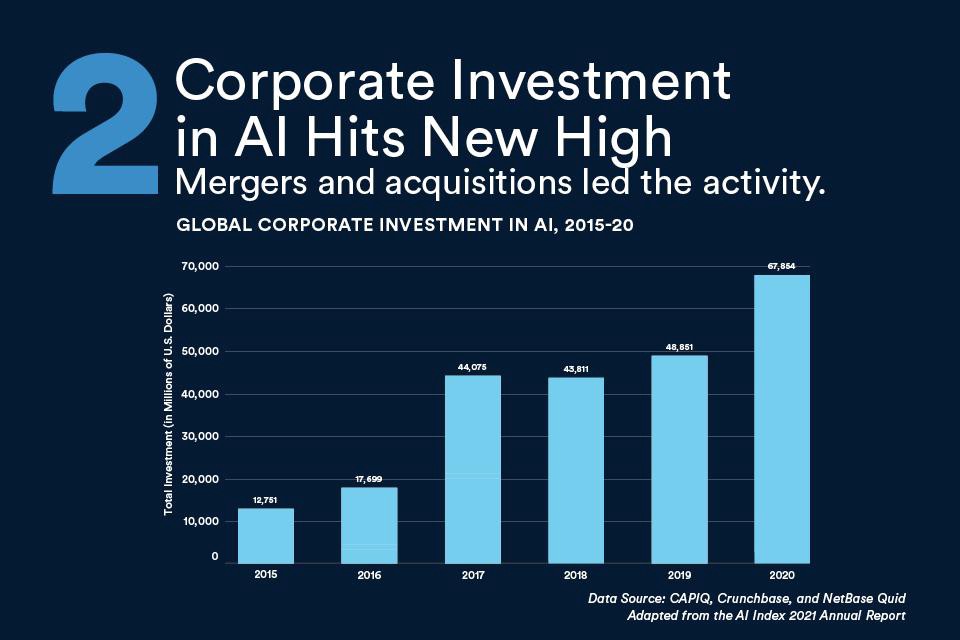
The potential rewards of integrating AI into your business are immense. According to the 2020 McKinsey Global AI Survey, AI is contributing more than 20% of EBIT for an elite group of AI practitioners. Additionally, these AI High Performers spend more of their budget on AI initiatives than competitors. They also have the capabilities to develop AI solutions in-house, instead of depending on external suppliers.

As Data Science matures, so does the pressure for the field to actually live up to the hype. The field needs to deliver tangible business benefits. A vital, yet underutilized role for the success of AI Products is the AI Product Owner (AI PO).
In this article, I share my perspective on the importance and required skills of AI POs. Instead of staffing AI Product development teams only with Data Scientists, AI POs increase the chances of successfully developing AI Products. The article describes how to build successful AI Product Teams, the role of an AI PO, and study resources to become one.
First, let’s analyze the roles of a traditional Product Owner and an AI Product Owner.
Product Owner vs. AI Product Owner
The role of the Product Owner is defined in the Scrum framework. Scrum is a popular agile development method. The framework requires the roles of a Product Owner, Scrum Master, and Developer.
Scrum pays meticulous attention to divide the product and people responsibilities between the Scrum Master and Product Owner. The Product Owner is responsible for maximizing the value of the Scrum team. She creates a product vision, communicates with stakeholders, and prioritizes the Product Backlog. Scrum alliance states that a PO needs business, user experience, technical, and communication skills.
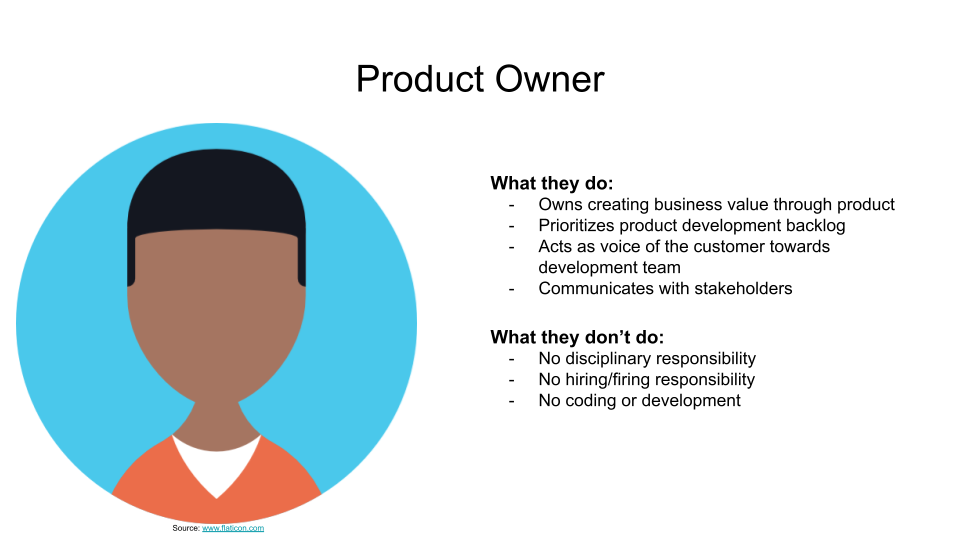
The AI PO role is an extended, specialized version of the general PO role. AI POs inherit the responsibilities of a general PO. They extend them to maximize the impact of AI-based Products.
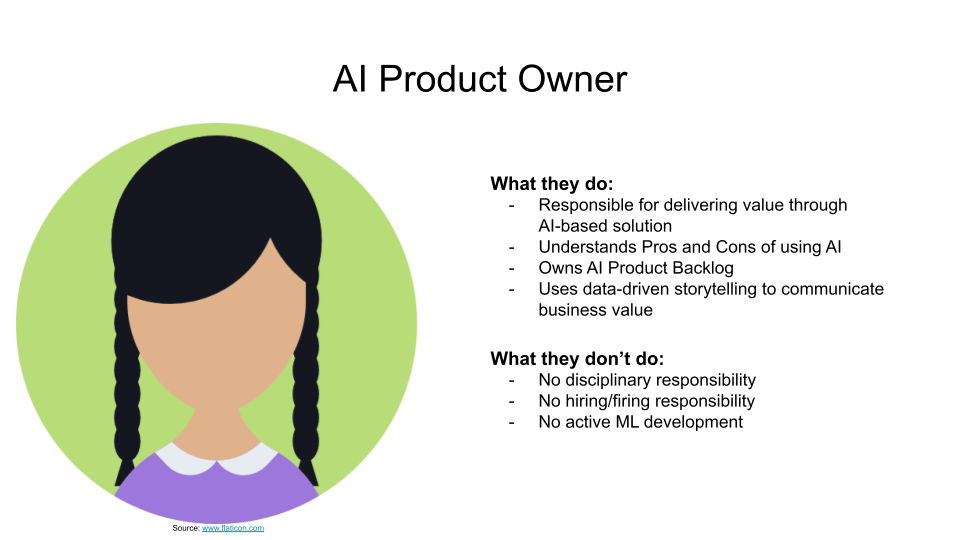
So, what skills do AI POs need? First and foremost, AI POs need to know about the potentials and pitfalls of AI-based applications. What is AI good at, where does it struggle? Which business problems could an AI-based solution solve, where is it misplaced?
Next, AI POs need to pay special attention to monitoring the predictions of AI models. AI is based on statistical assumptions, so the predictions always carry a degree of uncertainty. Depending on the context, a wrong prediction can cause severe consequences. AI POs should be able to design AI applications to include human decision-making when required.
Products having ML in their core in a production setting is still a nascent discipline, so there are many learnings being made by both PMs and entrepreneurs operating in this space. — Sahar Mor
AI Entrepreneur
Additionally, AI-based Products are dynamic. They measure how customers react to their predictions. AI Products also need to account for ongoing adjustments to data. When designing AI-based Products, AI POs need to keep the virtuous cycle of AI in mind. The true power of intelligent products comes from their ability to continuously improve based on new data.
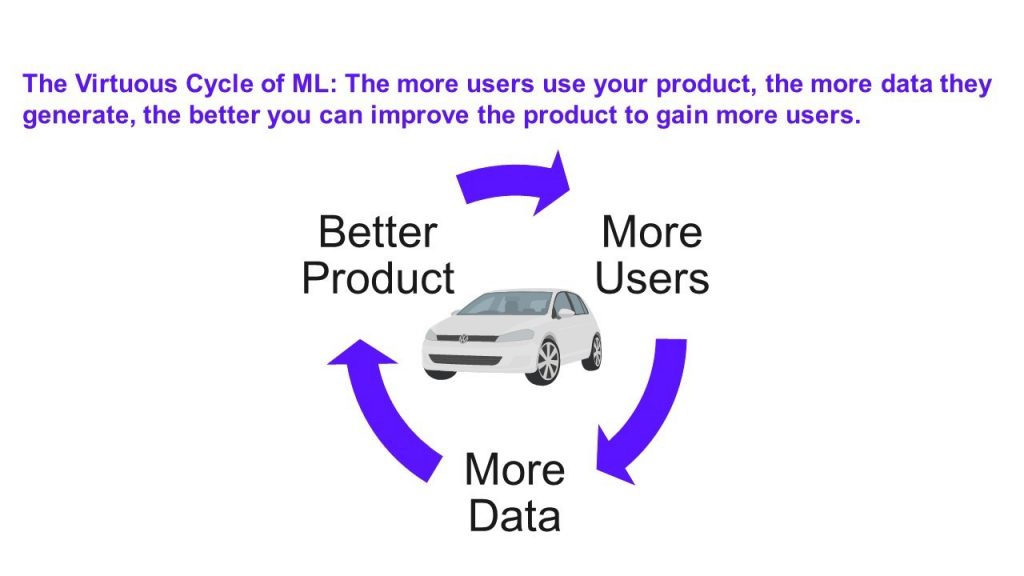
On the technical side, the more technical knowledge AI POs have, the better. AI POs neither need to be former developers nor have a Master’s degree in Computer Science. Yet, it is hard to understand what is easy and what is virtually impossible to implement with AI. The feasibility of an AI Product can be hard to evaluate for AI POs without the proper technical background. Please note that opinions differ here and others believe that technical knowledge is neither required for a PO nor AI PO.
Last but not least, AI POs understand that AI development is different from the software development workflow. AI development tests different hypotheses and iterates quickly. Traditional software development can follow a more modular and structured approach. Understanding that ML development isn’t as linear as traditional software development is crucial to communicating expectations with stakeholders and delivering value on time.
“Since the development lifecycle of AI projects is based on “searching” rather than “planning”, companies need professionals who are trained to look at products as optimization problems rather than a programming problems.” — Adnan Boz
Founder AI Product Management Institute
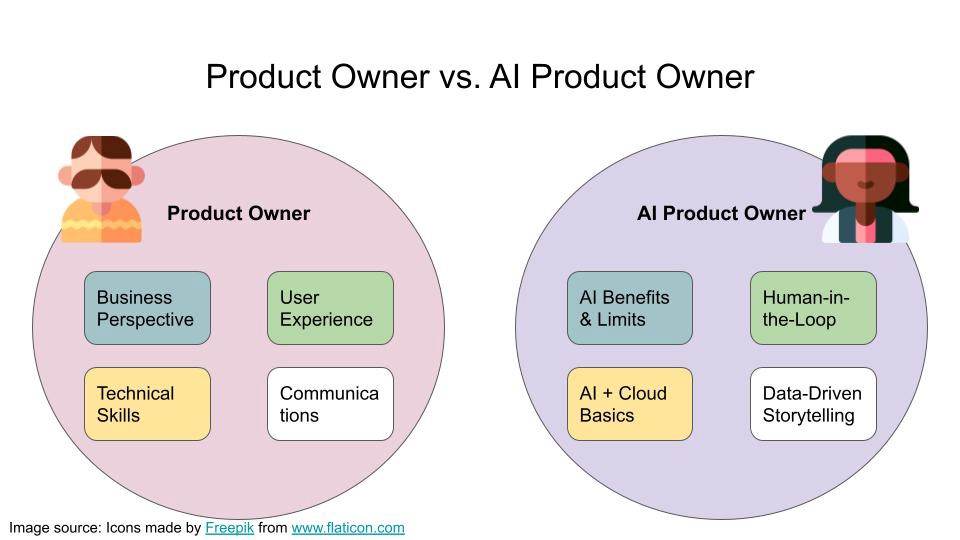
After understanding the role of the AI PO, let’s analyze how the AI PO works in an AI Product team.
Structuring data product teams
Delivering AI-based Products depends on forming cross-functional teams. Cross-functional teams are staffed with experts with complementary skills and roles. Too often, I have seen single-minded Data Science Teams struggling to operationalize their models. Requiring Data Scientists to fulfill all roles required to bring an AI-based Product to customers is a recipe for failure.
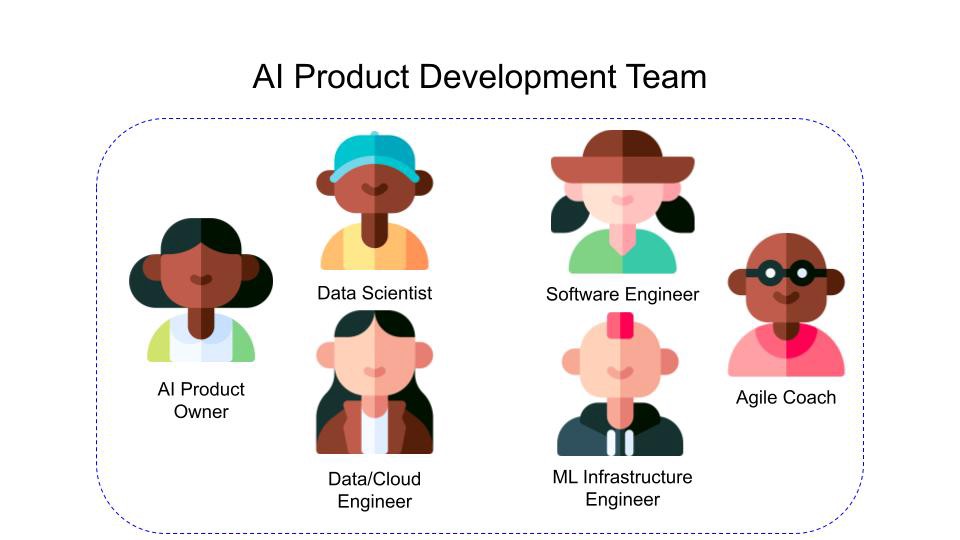
Instead, the AI PO supports Data Scientists by maximizing business value. The graphic above shows a prototypical AI Product development team with cross-functional experts. Don’t get hung up on the roles, they can change from one product to another. Some products might need AI UI/UX designers, some might not. However, I do believe that all AI Product teams should at least have an AI PO. You can also see that Data Scientist is just one role in the team, among many others.
Now that you know what an AI PO does, read on to see where you can learn to skills to become one.
Resources for AI POs
As you’ve seen, AI POs can play a significant role in productionizing AI Products. Luckily, there are plenty of resources to teach you to become an AI PO:
- AI Solution Product Management by Adnan Boz
- AI Product Manager Nanodegree by Udacity
- AI for Everyone by deeplearning.ai
First, I’d like to recommend the AI Product Management Institute by Adnan Boz. Adnan is doing great work in teaching at Stanford and working at Nvidia. He also started the AI Product Management Institute to develop AI POs. Adnan helps aspiring product owners break into the field of AI and has received thoroughly positive student feedback.
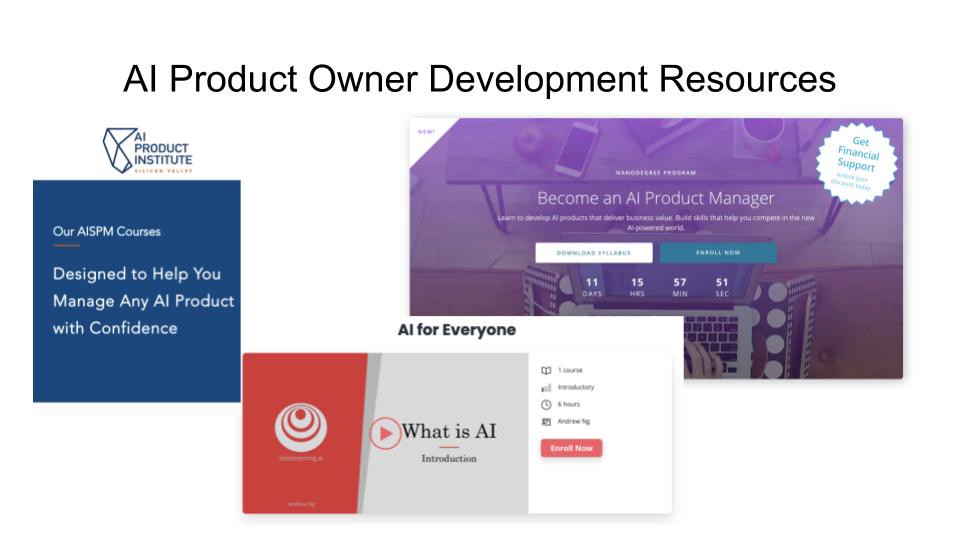
The Udacity nanodegree looks comprehensive and valuable. I heard good feedback about the program. The program takes two-months and covers a variety of AI PO skills to follow along with dataset creation, model building, and AI Product monitoring.
Lastly, I am an avid promoter of the deeplearning.ai content and have reviewed the “AI for Everyone” course myself before it was released. It’s not exactly targeted at developing AI Product Owners, but the course helps you understand the inner workings, benefits, and limitations of AI Products. For AI POs it is essential to understand the non-technical fundamentals of AI, which this course teaches you.
Please note that this is not a sponsored post, but my personal recommendation.
Key Takeaways
After reading this article, I hope you understand that we don’t need more Data Scientists, but more AI POs. Instead of requiring Data Scientists to cover all product development stages, the AI PO supports AI Product teams. The AI PO focuses on creating value through AI-based Products.
- AI POs are crucial for successfully developing AI-based applications
- AI POs understand the benefits and pitfalls of AI, design products to use the AI flywheel, and understand the AI development workflow
- AI Product teams need a variety of skills, and not only Data Scientists
After finishing this post, you have a better understanding of the need for AI POs and what they do.
Sources
Daniel Zhang, Saurabh Mishra, Erik Brynjolfsson, John Etchemendy, Deep Ganguli, Barbara Grosz, Terah Lyons, James Manyika, Juan Carlos Niebles, Michael Sellitto, Yoav Shoham, Jack Clark, and Raymond Perrault, “The AI Index 2021 Annual Report,” AI Index Steering Committee, Human-Centered AI Institute, Stanford University, Stanford, CA, March 2021.
The AI Index 2021 Annual Report by Stanford University is licensed under Attribution-NoDerivatives 4.0 International. To view a copy of this license, visit http://creativecommons.org/licenses/by-nd/4.0/.
Tara Balakrishnan, Michael Chui, Bryce Hall, Nicolaus Henke, “Global survey: The state of AI in 2020”, McKinsey Analytics, Retrieved from McKinsey.com, March 2021.
Originally published on Medium.




